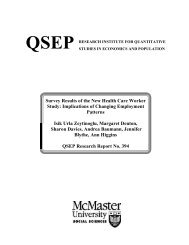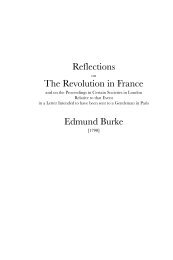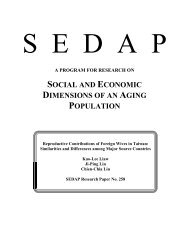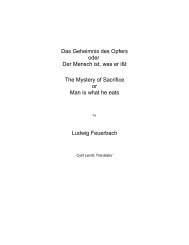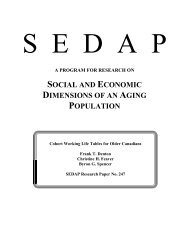Two Treatises Government John Locke - Faculty of Social Sciences ...
Two Treatises Government John Locke - Faculty of Social Sciences ...
Two Treatises Government John Locke - Faculty of Social Sciences ...
You also want an ePaper? Increase the reach of your titles
YUMPU automatically turns print PDFs into web optimized ePapers that Google loves.
36/<strong>John</strong> <strong>Locke</strong>Chapter VIOf Adam’s Title to Sovereignty by Fatherhood.§50. There is one thing more, and then I think I have given you all thatour author brings for pro<strong>of</strong> <strong>of</strong> Adam’s sovereignty, and that is a supposition<strong>of</strong> a natural right <strong>of</strong> dominion over his children, by being theirfather: and this title <strong>of</strong> fatherhood he is so pleased with, that you willfind it brought in almost in every page; particularly he says, “not onlyAdam, but the succeeding patriarchs had, by right <strong>of</strong> fatherhood, royalauthority over their children,” p. 12. And in the same page, “this subjection<strong>of</strong> children being the fountain <strong>of</strong> all regal authority,” &c. This being,as one would think by his so frequent mentioning it, the main basis<strong>of</strong> all his frame, we may well expect clear and evident reason for it,since he lays it down as a position necessary to his purpose, that “everyman that is born is so far from being free, that by his very birth hebecomes a subject <strong>of</strong> him that begets him,” O. 156. So that Adam beingthe only man created, and all ever since being begotten, nobody hasbeen born free. If we ask how Adam comes by this power over hischildren, he tells us here it is lay begetting them: and so again, O.223,“This natural dominion <strong>of</strong> Adam,” says he, “may be proved out <strong>of</strong> Grotiushimself, who teacheth that ‘generations jus acquiritur parentibus inliberos.’” And indeed the act <strong>of</strong> begetting being that which makes a mana father, his right <strong>of</strong> a father over his children can naturally arise fromnothing else.§51. Grotius tells us Lot here how far this “jus in liberos,” thispower <strong>of</strong> parents over their children extends; but our author, alwaysvery clear in the point, assures us it is supreme power, and like that <strong>of</strong>absolute monarchs over their slaves, absolute power <strong>of</strong> life and death.He that should demand <strong>of</strong> him how, or for what reason it is, that begettinga child gives the father such an absolute power over him, will findhim answer nothing: we are to take his word for this, as well as severalother things, and by that the laws <strong>of</strong> nature and the constitutions <strong>of</strong>government must stand or fall. Had he been an absolute monarch, thisway <strong>of</strong> talking might have suited well enough; “pro ratione voluntas,”might have been <strong>of</strong> force in his mouth; but in the way <strong>of</strong> pro<strong>of</strong> or argumentis very unbecoming, and will little advantage his plea for absolutemonarchy. Sir Robert has too much lessened a subject’s authority toleave himself the hopes <strong>of</strong> establishing any thing by his bare saying it;one slave’s opinion without pro<strong>of</strong>, is not <strong>of</strong> weight enough to dispose <strong>of</strong>the liberty and fortunes <strong>of</strong> all mankind. If all men are not, as I think they




